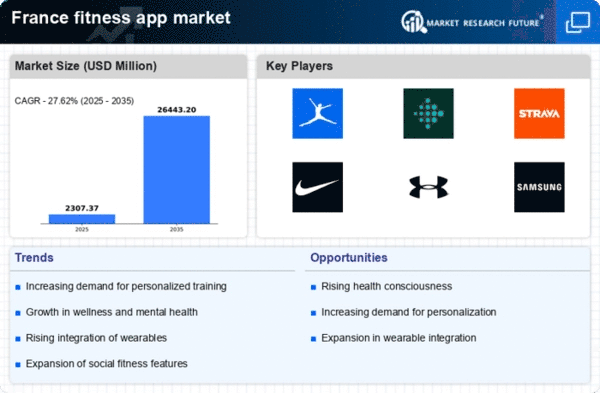The fitness app market in France is characterized by a dynamic competitive landscape, driven by increasing health consciousness and the integration of technology into personal fitness. Major players such as MyFitnessPal (US), Fitbit (US), and Strava (US) are at the forefront, each adopting distinct strategies to enhance their market presence. MyFitnessPal (US) focuses on user engagement through personalized nutrition tracking and community features, while Fitbit (US) emphasizes hardware integration with its wearables, creating a seamless ecosystem for users. Strava (US), on the other hand, leverages its strong community of athletes to foster user loyalty and engagement, positioning itself as a social platform for fitness enthusiasts. Collectively, these strategies contribute to a competitive environment that is increasingly centered around user experience and technological innovation.
In terms of business tactics, companies are increasingly localizing their offerings to cater to the unique preferences of the French market. This includes optimizing supply chains to ensure timely delivery of services and products. The market structure appears moderately fragmented, with several key players vying for dominance. However, the influence of major companies is substantial, as they set trends that smaller competitors often follow, thereby shaping the overall market dynamics.
In October 2025, MyFitnessPal (US) announced a partnership with a leading French health insurance provider to offer premium users personalized health insights based on their fitness data. This strategic move not only enhances user value but also positions MyFitnessPal (US) as a key player in the health and wellness ecosystem, potentially increasing its user base through the insurance provider's network. The collaboration suggests a shift towards integrating fitness apps with broader health management solutions.
In September 2025, Fitbit (US) launched a new feature that allows users to track their mental well-being alongside physical fitness metrics. This initiative reflects a growing recognition of the importance of holistic health, appealing to a broader audience. By incorporating mental health tracking, Fitbit (US) may attract users who prioritize overall wellness, thereby expanding its market reach and reinforcing its brand as a comprehensive health solution.
In August 2025, Strava (US) introduced a subscription model that offers exclusive content and features tailored to serious athletes. This strategic pivot aims to monetize its user base more effectively while providing enhanced value to dedicated users. The move indicates a trend towards premiumization in the fitness app market, where companies seek to differentiate themselves through exclusive offerings that cater to niche segments.
As of November 2025, current trends in the fitness app market include a strong emphasis on digitalization, sustainability, and the integration of artificial intelligence (AI) into user experiences. Strategic alliances are increasingly shaping the competitive landscape, as companies collaborate to enhance their technological capabilities and expand their service offerings. Looking ahead, competitive differentiation is likely to evolve, with a shift from price-based competition to a focus on innovation, technology, and supply chain reliability. This transition underscores the importance of creating unique value propositions that resonate with consumers in an increasingly crowded marketplace.

























Leave a Comment